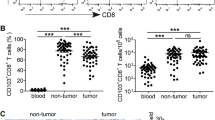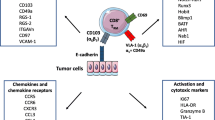Previous studies have indicated that the infiltration of CD8+ T cells in colorectal cancer is an independent predictor of increased survival but clinical observations have suggested that the cytotoxic function of CD8+ T cells infiltrating colorectal cancer may often be limited. In this study, we have assessed the phenotype of colorectal cancer CD8+ tumor-infiltrating lymphocytes (TILs) isolated ex vivo from tumor tissue, and assessed the perforin content of TIL with respect to their location using immunohistochemistry. We found that CD8+ T cells TILs isolated from colorectal cancer are mainly composed of antigen-experienced cells of effector memory type (TEM, CD45RA-CCR7−, and CD27+/CD28− or CD27−/CD28−), and contain only minor proportions of terminally differentiated CD8+ T cells (TEMRA, CD45RA+CCR7−). The perforin content of these TILs, however, is significantly lower than that of antigen-experienced T cells in PBMCs due to the much lower levels of perforin found in the CD27-CD28− subset in TILs compared with CD8+ T cells of similar phenotype in PBMCs.




Similar content being viewed by others
REFERENCES
Saeterdal I, Bjorheim J, Lislerud K, et al.: Frameshift-mutation-derived peptides as tumor-specific antigens in inherited and spontaneous colorectal cancer. Proc Natl Acad Sci USA 98:13255–13260, 2001
Linnebacher M, Gebert J, Rudy W, et al.: Frameshift peptide-derived T-cell epitopes: A source of novel tumor-specific antigens. Int J Cancer 93:6–11, 2001
Ito M, Shichijo S, Miyagi Y, et al.: Identification of SART3-derived peptides capable of inducing HLA-A2-restricted and tumor-specific CTLs in cancer patients with different HLA-A2 subtypes. Int J Cancer 88:633–639, 2000
Nagorsen D, Keilholz U, Rivoltini L, et al.: Natural T-cell response against MHC class I epitopes of epithelial cell adhesion molecule, her-2/neu, and carcinoembryonic antigen in patients with colorectal cancer. Cancer Res 60:4850–4854, 2000
Scanlan MJ, Welt S, Gordon CM, et al.: Cancer-related serological recognition of human colon cancer: Identification of potential diagnostic and immunotherapeutic targets. Cancer Res 62:4041–4047, 2002
Li M, Yuan YH, Han Y, Liu YX, Yan L, Wang Y, Gu J: Expression profile of cancer-testis genes in 121 human colorectal cancer tissue and adjacent normal tissue. Clin Cancer Res 11:1809–1814, 2005
Naito Y, Saito K, Shiiba K, et al.: CD8+ T cells infiltrated within cancer cell nests as a prognostic factor in human colorectal cancer. Cancer Res 58:3491–3494, 1998
Sallusto F, Lenig D, Forster R, Lipp M, Lanzavecchia A: Two subsets of memory T lymphocytes with distinct homing potentials and effector functions. Nature 401:708–712, 1999
Appay V, Dunbar PR, Callan M, et al.: Memory CD8+ T cells vary in differentiation phenotype in different persistent virus infections. Nat Med 8:379–385, 2002
Dunn GP, Bruce AT, Ikeda H, Old LJ, Schreiber RD: Cancer immunoediting: From immunosurveillance to tumor escape. Nat Immunol 3:991–998, 2002
Mortarini R, Piris A, Maurichi A, et al.: Lack of terminally differentiated tumor-specific CD8+ T cells at tumor site in spite of antitumor immunity to self-antigens in human metastatic melanoma. Cancer Res 63:2535–2545, 2003
Zippelius A, Batard P, Rubio-Godoy V, et al.: Effector function of human tumor-specific CD8 T cells in melanoma lesions: A state of local functional tolerance. Cancer Res 64:2865–2873, 2004
Sprent J, Surh CD: T cell memory. Annu Rev Immunol 20:551–579, 2002
Hishii M, Kurnick JT, Ramirez-Montagut T, Pandolfi F: Studies of the mechanism of cytolysis by tumour-infiltrating lymphocytes. Clin Exp Immunol 116:388–394, 1999
Smyth MJ, Thia KY, Street SE, MacGregor D, Godfrey DI, Trapani JA, et al.: Perforin-mediated cytotoxicity is critical for surveillance of spontaneous lymphoma. J Exp Med 192:755–760, 2000
Smyth MJ, Street SE, Trapani JA: Cutting edge: Granzymes A and B are not essential for perforin-mediated tumor rejection. J Immunol 171:515–518, 2003
Gupta S: Molecular mechanisms of apoptosis in the cells of the immune system in human aging. Immunol Rev 205:114–129, 2005
Watanabe N, Hizuta A, Tanaka N, Orita K: Localization of T cell receptor (TCR)-γδ+ T cells into human colorectal cancer: Flow cytometric analysis of TCR-γδ expression in tumor-infiltrating lymphocytes. Clin Exp Immunol 102:161–173, 1995
Tomiyama H, Matsuda T, Takiguchi M: Differentiation of human CD8+ T cells from a memory to memory/effector phenotype. J Immunol 168:5538–5550, 2002
Tomiyama H, Takata H, Matsuda T, Takiguchi M: Phenotypic classification of human CD8+ T cells reflecting their function: Inverse correlation between quantitative expression of CD27 and cytotoxic effector function. Eur J Immunol 34:999–1010, 2004
Rubio V, Stuge TB, Singh N, et al. Ex vivo identification and analysis of tumor-cytolytic T cells. Nat Med 9(11):1377–1382, 2003
Guidoboni M, Gafa R, Viel A, et al.: Microsatellite instability and high content of activated cytotoxic lymphocytes identify colon cancer patients with a favorable prognosis. Am J Pathol 159:297–304, 2001
Neilsen HJ, Hansen U, Christensen IJ, Reimert CM, Brunner N, Moesggaard F: Independent prognotic value of eosiniphil and mast cell infiltration in colorectal cancer. J Pathol 189:487–495, 1999
Yannelli JR, Hyatt C, McConnell S, et al.: Growth of tumor-infiltrating lymphocytes from human solid cancers: Summary of a 5-year experience. Int J Cancer 65:413–421, 1996
Hawkins MJ, Atkins MB, Dutcher JP, et al.: A phase II clinical trial of interleukin-2 and lymphokine-activated killer cells in advanced colorectal carcinoma. J Immunother 15:74–78, 1994
Fabbri M, Ridolfi R, Maltoni R, et al.: Tumor infiltrating lymphocytes and continuous infusion interleukin-2 after metastasectomy in 61 patients with melanoma, colorectal and renal carcinoma. Tumori 86:46–52, 2000
Marincola FM, Wang E, Herlyn M, Seliger B, Ferrone S: Tumor as elusive targets of T-cell-based active immunotherapy. Trends Immunol 24(6):334–341, 2003
Diederichsen ACP, Zeuthen J, Christensen PB, Kristensen T: Characterisation of tumor infiltrating lymphocytes and correlation with immunological surface molecules in colorectal caner. Eur J Cancer 35(5):721–726, 1999
Costantinia A, Mancinia S, Giuliodoroa S, Butinia L, Regnerya CM, Silvestrib G, Montronia M: Effects of cryopreservation on lymphocyte immunophenotype and function. J Immunol Methods 278:145–155, 2003
Champagne P, Ogg FS, King AS, et al.: Skewed maturation of memory HIV-specific CD8 T lymphocyte. Nature 410:106–111, 2001
Unitt E, Rushbrook SM, Marshall A, et al.: Compromised lymphocytes infiltrate hepatocellular carcinoma: The role of T-regulatory cells. Hepatology 41:722–730, 2005
Spiotto MT, Rowley DA, Schreiber H: Bystander elimination of antigen loss variants in established tumors. Nat Med 10:294–298, 2004
Spiotto MT, Schreiber H: Rapid destruction of the tumor microenvironment by CTLs recognizing cancer-specific antigens crosspresented by stromal cells. Cancer Immun 5:8–15, 2005
ACKNOWLEDGEMENTS
This study was supported by Designed Grant of Cancer Research Institute (New York, NY), New Star Program of Science and Technology of Beijing Science and Technology Committee (H020821070130), “211” Program of Peking University, and Science Foundation of Beijing Cancer Hospital
Author information
Authors and Affiliations
Corresponding authors
Rights and permissions
About this article
Cite this article
YE, SW., WANG, Y., VALMORI, D. et al. Ex-Vivo Analysis of CD8+ T Cells Infiltrating Colorectal Tumors Identifies a Major Effector-Memory Subset with Low Perforin Content. J Clin Immunol 26, 447–456 (2006). https://doi.org/10.1007/s10875-006-9040-4
Received:
Accepted:
Published:
Issue Date:
DOI: https://doi.org/10.1007/s10875-006-9040-4




